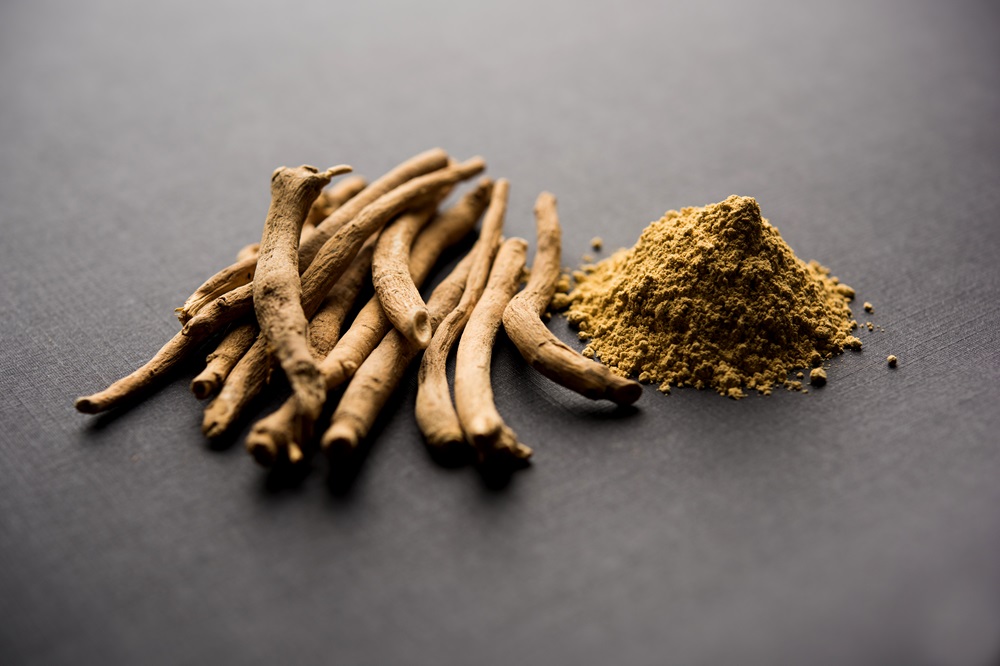Ashwagandha - What Should It Not Be Combined With? Contraindications and Possible Interactions

Ashwagandha is a plant considered an adaptogen, enjoying significant popularity among consumers worldwide. Due to its wealth of valuable compounds, Withania somnifera is widely available in the form of dietary supplements, often used as a beneficial addition to the daily diet. Ashwagandha - when to take it: morning or evening? How should supplements containing Withania somnifera be used?
Table of contents
What is ashwagandha?
Ashwagandha, known in Latin as Withania somnifera, is an evergreen shrub from the nightshade family that can grow up to 150 cm tall. It grows naturally in parts of Southeast Asia, as well as in Africa and Mediterranean countries such as Greece and Spain.
Ashwagandha is classified as an adaptogen – a natural substance that can help normalize the body’s homeostasis, increasing its resistance to stress factors. It is considered a treasure trove of beneficial compounds, including withanolides, and is commonly used in dietary supplements.
Also called Indian ginseng or winter cherry, ashwagandha may help lower stress levels in the body and reduce feelings of anxiety and tension. It may also provide a range of other health-supporting benefits, aiding the body’s daily functioning.
Ashwagandha - morning or evening?
Many people considering supplements with Withania somnifera wonder when the best time is to take ashwagandha. The answer is simple – it depends. The right time is individual and influenced not only by personal preference but also by the desired effects.
If the goal is to calm and relax the body, it is best to take the supplement in the evening, about an hour before bed. This can help reduce cortisol levels and therefore lower stress, positively affecting overall well-being. Taken at night, ashwagandha may support falling asleep more easily and improve the quality of nighttime rest.
On the other hand, if the aim is to boost stress resilience, motivation, and performance during daily tasks, it may be better to take it in the morning, right after waking up. However, it’s worth checking whether morning ashwagandha intake causes drowsiness – if so, switching to evening use might be more effective.
Ashwagandha - when to take it?
People who experience digestive issues should consider taking ashwagandha with or right after a meal, as Indian ginseng on an empty stomach may cause unwanted symptoms like bloating, stomach pain, or nausea.
What about physically active individuals? In this case, the best time depends on the athlete’s personal needs.
As an adaptogen, ashwagandha is believed to help improve muscle endurance, making pre-workout intake a potentially good choice. However, because it may cause drowsiness in some people, taking it after training or before bed could be better – this way, it might support recovery processes and help reduce inflammation in muscles.
How to supplement with ashwagandha?
It is best to take ashwagandha extract supplements with a high-fat meal, which may improve absorption and utilization in the body.
When using ashwagandha, it’s important to be aware of possible interactions with other medications. It’s also crucial to follow the manufacturer’s recommendations on the product label – while ashwagandha is generally considered safe, excessive intake may cause side effects such as vomiting or diarrhea.
For optimal results, focus first on regular supplementation, then adjust the timing to match your body’s needs and your personal goals. Regardless of whether it’s taken in the morning or at night, ashwagandha can positively influence the body and help achieve desired effects.

